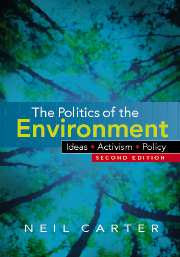Book contents
- Frontmatter
- Contents
- List of figures
- List of tables
- List of boxes
- Preface to the second edition
- Acknowledgements
- Abbreviations
- Glossary
- 1 Introduction
- PART 1 Theory: thinking about the environment
- PART 2 Parties and movements: getting from here to there
- PART 3 Environmental policy: achieving a sustainable society
- References
- Index
PART 3 - Environmental policy: achieving a sustainable society
Published online by Cambridge University Press: 05 June 2012
- Frontmatter
- Contents
- List of figures
- List of tables
- List of boxes
- Preface to the second edition
- Acknowledgements
- Abbreviations
- Glossary
- 1 Introduction
- PART 1 Theory: thinking about the environment
- PART 2 Parties and movements: getting from here to there
- PART 3 Environmental policy: achieving a sustainable society
- References
- Index
Summary
The discussion of environmental policy in Part III is in many respects a long way away from some of the abstract debates covered in Part I, or even the ambitious aspirations of some forms of environmental activism examined in Part II. It focuses on the practical challenges facing governments today. The interdependence of environmental issues poses a distinctive set of problems for policymakers. Few other policy areas can match it for sheer complexity. Nor are failures in most other policy areas likely to be as catastrophic or irredeemable as those affecting the environment, especially if the more pessimistic harbingers of environmental doom are correct.
The belief that economic growth must be given priority over environmental protection continues to govern the way many policymakers approach environmental issues. This traditional policy paradigm has proved inadequate for resolving the intractable problems posed by contemporary environmental issues. Consequently, since the late 1980s, the alternative policy paradigm of sustainable development has gradually come to dominate thinking about environmental policy. The central premise of sustainable development is that there need not be a trade-off between economic growth and environment; no longer need policymakers think in terms of the environment versus the economy. This message has made sustainable development politically appealing, with most governments, international institutions, political parties, business organisations and environmental NGOs now keen to proclaim their commitment to sustainable development. The broad aim of Part III is to examine the difficulties facing governments seeking to make the transition to sustainable development.
- Type
- Chapter
- Information
- The Politics of the EnvironmentIdeas, Activism, Policy, pp. 171 - 172Publisher: Cambridge University PressPrint publication year: 2007



